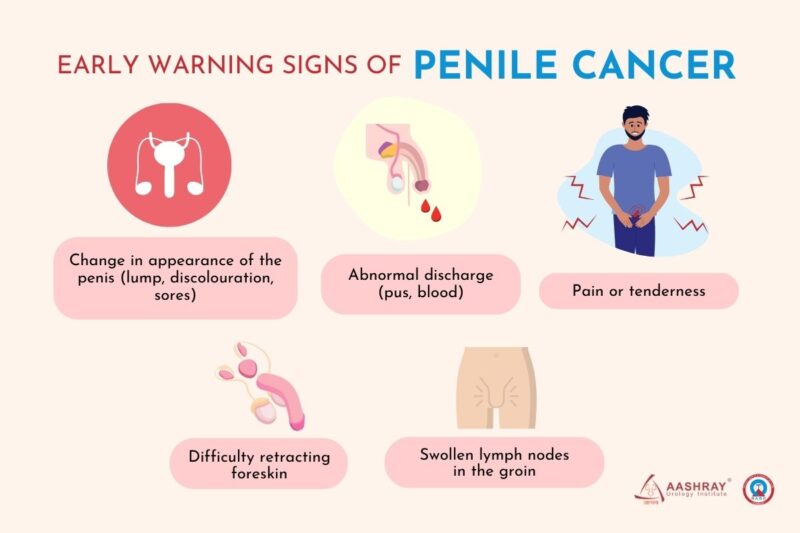Penile Cancer (PeCa)

Penile Cancer (PeCa): Causes and Risk Factors
Penile cancer (PeCa) is a rare malignancy that primarily affects men over the age of 50, with the average diagnosis age around 60–68 years. It arises when abnormal cells in the penis grow uncontrollably, often linked to several risk factors.
Major Risk Factors
1. Human Papillomavirus (HPV) Infection
- HPV infection is a leading cause, implicated in about 50–60% of penile cancer cases.
- High-risk HPV types 16 and 18 are most commonly involved.
- HPV is transmitted through skin-to-skin contact, including vaginal, anal, oral sex, and genital contact.
- Condoms reduce HPV transmission risk, and circumcision may lower HPV infection rates.
- Persistent HPV infection can cause cellular changes leading to cancer.
2. Phimosis and Poor Hygiene
- Phimosis is a condition where the foreskin cannot be fully retracted, leading to smegma accumulation (a buildup of dead skin cells, oils, and secretions).
- This can cause chronic inflammation and irritation, increasing cancer risk.
- Lack of circumcision is associated with higher risk due to difficulties in maintaining hygiene.
3. Tobacco Use
- Smoking and other tobacco use increase penile cancer risk by exposing penile cells to carcinogens that damage DNA.
- Tobacco use combined with HPV infection further elevates risk.
4. Age
- Risk increases with age, with most cases diagnosed in men over 50, particularly after age 60.
5. Chronic Inflammation and Skin Conditions
- Conditions like balanitis (inflammation of the glans), posthitis, and lichen sclerosus (a chronic inflammatory skin condition) are linked to higher penile cancer risk.
- History of these conditions is more common in penile cancer patients.
6. Immunosuppression
- Weakened immune systems, such as in HIV/AIDS or post-organ transplant patients, increase susceptibility to HPV and cancer development.
7. Other Factors
- Ultraviolet light treatment (PUVA) for psoriasis involving the genital area may slightly increase risk.
- Sexual behavior patterns, including multiple partners and lack of condom use, may contribute.
Preventive Measures
- HPV Vaccination: Protects against high-risk HPV types linked to penile cancer.
- Safe Sexual Practices: Use of condoms reduces HPV transmission.
- Circumcision: Especially in infancy or early childhood, reduces risk by improving hygiene and lowering HPV infection.
- Smoking Cessation: Avoiding tobacco reduces carcinogen exposure.
- Good Genital Hygiene: Regular cleaning can prevent smegma buildup and inflammation.
- Prompt Treatment of Phimosis and Inflammatory Conditions: Circumcision or medical management when indicated.
Summary Table
| Risk Factor | Description |
|---|---|
| Human Papillomavirus (HPV) | High-risk types 16 and 18 cause ~50-60% of cases; transmitted via skin-to-skin sexual contact |
| Phimosis and Smegma | Foreskin constriction causing poor hygiene and chronic inflammation |
| Tobacco Use | Smoking increases DNA damage and cancer risk |
| Age | Most common in men over 50–60 years old |
| Chronic Inflammation | Balanitis, lichen sclerosus linked to increased risk |
| Immunosuppression | HIV/AIDS and immunosuppressive treatments raise risk |
| PUVA Therapy | UV light treatment for psoriasis may slightly increase risk |
Consult with Our Team of Experts Now!
At DrStemCellsThailand (DRSCT)‘s Anti-Aging and Regenerative Medicine Center of Thailand, we emphasize comprehensive evaluations and personalized treatment plans of Cellular Therapy and Stem Cells for managing various health conditions. If you have questions about Penile Cancer or would like more information on our services, consult with our experts today!
Consult with Our Team of Experts Now!
References
- Cancer Research UK. Risks and causes of penile cancer.
https://www.cancerresearchuk.org/about-cancer/penile-cancer/risks-causes - American Cancer Society. Risk Factors for Penile Cancer.
https://www.cancer.org/cancer/types/penile-cancer/causes-risks-prevention/risk-factors.html - NHS. Causes of penile cancer.
https://www.nhs.uk/conditions/penile-cancer/causes/ - University of Rochester Medical Center. Penile Cancer Risk Factors.
https://www.urmc.rochester.edu/encyclopedia/content?contenttypeid=34&contentid=18963-1 - PMC. Risk Factors and Prevalence of Penile Cancer.
https://www.ncbi.nlm.nih.gov/pmc/articles/PMC4663967/ - Moffitt Cancer Center. Penile Cancer Causes & Risk Factors.
https://www.moffitt.org/cancers/penile-cancer/diagnosis/risk-factors/
Penile cancer is strongly linked to HPV infection, poor genital hygiene, phimosis, tobacco use, and age. Preventive strategies like HPV vaccination, safe sex, circumcision, and smoking cessation can reduce risk. Early recognition of symptoms and risk factors is important for timely diagnosis and treatment.















